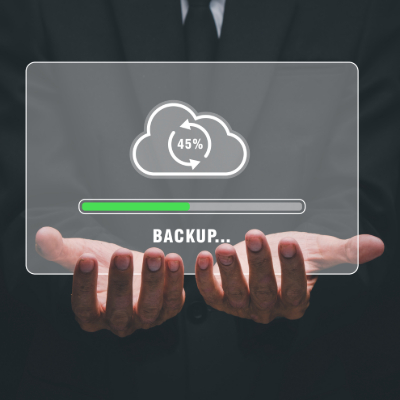Don’t Let Your Data Vanish into the Ether… Back It Up!

When your business’ data is so crucial to your successful operations, there are certain precautions that you simply need to take for the sake of your business’ longevity. One such precaution: data backup.
Your data is the gas that powers your business’ engine, whether you’re referring to project files and intellectual property or financial info and customer records. As such, imagine what it would mean if your business ran out of gas… or, more accurately, it was siphoned out.
A Data Backup Prevents Your Business from Experiencing Calamity
To appreciate how critical a comprehensive data backup is, let’s explore some of the circumstances that a backup can help you navigate more easily:
- Cyberattacks – As one example, consider ransomware. As this attack vector relies on encrypting your business’ data, having a backup to fall back on can save your metaphorical bacon.
- Hardware failure – Your business’ infrastructure isn’t infallible. Various causes can lead to lost data, from age to use to power fluctuations, which means a backup is necessary to maintain the course.
- Human error – To err is human, as the saying goes. From accidentally deleting or overwriting data to an unfortunately-placed coffee spill, there are plenty of ways you and your team can inadvertently lose data. A backup helps ensure you don’t.
- Natural disasters – Whatever it is that damages your infrastructure, from fire to flood to earthquake and anything else, your data could easily fall victim. A backup gives you a copy to fall back on.
Of Course, Your Backups Need to Be Maintained for This to Work
If proper backup practices are not followed diligently, however, the consequences to a business will be severe. For example…
- Financial ruin – Consider what would happen to your business’ cash flow if you lost all your sales data and couldn’t accurately bill your customers, all while you suddenly have to pay to recover what data you can and have regulatory fines imposed on you. It’s little wonder that many businesses that lack proper backups never fully recover or even fail as a result.
- Operational hurdles – When data is so critical to your operations, losing it can mean that everything stops, from any projects to customer service. A backup can serve as a substitute server and allow your productivity to continue.
- Reputational harm – If your data loss results in the loss or compromise of customer information, or they can’t enjoy the benefits of your services, you lose a lot of hard-earned trust.
- Compliance issues – Different industries are often subject to regulations that dictate the data retention and security policies businesses must uphold, lest they face significant fines and legal issues. A backup is one part of ensuring these regulations can be met.
Enjoy Greater Peace of Mind with Our Help
As critical as backups are, it is not uncommon for other needs to push them down the to-do list. Working with us can help prevent this outcome.
Our proactive technology support services and the backup and disaster recovery services we offer are shaped to your business, and feature:
- Automation – Human error and manual backups don’t mix well. By automating your backups, we eliminate the risk that data will be lost because someone forgot to run them.
- Security – By storing data offsite, in multiple secured locations, your data is inherently protected from various threats.
- Testing and Verification – A backup that doesn’t work isn’t really a backup at all. We’ll test your backups to ensure they work, so you don’t discover an issue when they’re needed.
- Disaster Recovery – A backup is a key element of comprehensive disaster recovery and business continuity, and will be necessary to protect your operations against downtime.
We want to make sure you never have to learn how vital backups are firsthand, but that said, we want to make sure you are ready if you ever have to do so.
Work with us, and let us take over data protection on your behalf. Reach out to us today at (603) 889-0800 to set up a consultation.


